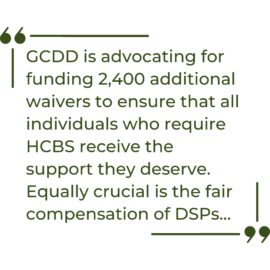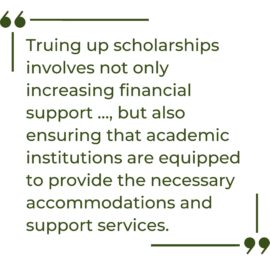
Hello! My name is Charlotte Densmore. I joined the Georgia Council on Developmental Disabilities (GCDD) as the Public Policy Director in August 2023. My involvement in disability advocacy originated from my work as a mentor with the EXCEL (Expanding Career, Education, and Leadership Opportunities) program at the Georgia Institute of Technology. It almost seems serendipitous that I can now combine my personal and academic experiences in my work at GCDD.
The upcoming legislative session provides a unique opportunity to advance inclusivity, empower communities, and foster independence for individuals with developmental disabilities (DD) in Georgia. In this article, I will outline the three key policy areas that the council has decided to focus its advocacy on for the 2024 Georgia General Assembly: (1) increasing Home and Community-Based Services (HCBS) waivers and Direct Support Professional (DSP) wages; (2) improving employment opportunities; and (3) ‘truing up’ scholarships for inclusive postsecondary education (IPSE).
Waivers and Wages
 Access to HCBS is fundamental to ensuring individuals with DD can live fulfilling lives in their communities. The demand for HCBS waivers remains high, with over 7,000 individuals on the waitlist, and the upcoming legislative session presents an opportunity to address this need. GCDD is advocating for funding 2,400 additional waivers to ensure that all individuals who require HCBS receive the support they deserve.
Access to HCBS is fundamental to ensuring individuals with DD can live fulfilling lives in their communities. The demand for HCBS waivers remains high, with over 7,000 individuals on the waitlist, and the upcoming legislative session presents an opportunity to address this need. GCDD is advocating for funding 2,400 additional waivers to ensure that all individuals who require HCBS receive the support they deserve.
Equally crucial is the fair compensation of DSPs who play a pivotal role in the lives of individuals with DD. DSPs provide essential care, fostering independence and community integration. Yet, low wages persist as a significant challenge, leading to high turnover rates and impacting the quality of care. Funding the Georgia Department of Behavioral Health and Developmental Disabilities (DBHDD) rate study will increase wages for DSPs, recognizing their invaluable contributions to the well-being of individuals with DD.
Employment
Creating inclusive employment opportunities is key to empowering individuals with DD. The next legislative session presents an opportune moment to address two critical aspects of employment policy: ending subminimum wage practices and implementing ‘State as a Model Employer.’
 The practice of paying individuals with disabilities wages below the established minimum has been legal for decades. This policy traces back to the Fair Labor Standards Act of 1938, a landmark legislation that set forth standards for minimum wage rates and overtime pay. Within this act, a special exemption (called the 14c certificate) was made that allowed employers to pay less than the minimum wage to workers with disabilities. While this was once considered a progressive policy, aiming to facilitate the employment of veterans with disabilities in a manufacturing-oriented economy, 14c certificates are increasingly viewed as inequitable.
The practice of paying individuals with disabilities wages below the established minimum has been legal for decades. This policy traces back to the Fair Labor Standards Act of 1938, a landmark legislation that set forth standards for minimum wage rates and overtime pay. Within this act, a special exemption (called the 14c certificate) was made that allowed employers to pay less than the minimum wage to workers with disabilities. While this was once considered a progressive policy, aiming to facilitate the employment of veterans with disabilities in a manufacturing-oriented economy, 14c certificates are increasingly viewed as inequitable.
In Georgia, there are roughly 300 14c certificate holders, meaning that about 300 individuals with disabilities are making less than minimum wage ($7.25) for their work. Continuing to pay individuals subminimum wages perpetuates inequality and hinders progress towards an inclusive workforce. GCDD advocates for policies that eliminate subminimum wage practices and ensure that individuals with DD receive fair compensation for their work. This not only aligns with the principles of equality outlined in the Developmental Disabilities Act (2000) but also contributes to building a workforce that values diversity and inclusivity.
Furthermore, the state must lead by example in promoting inclusive employment practices. State as Model Employer (SAME) is a policy that would require state agencies to set goals for the recruitment and retention of people with disabilities. By enacting policies that position Georgia as a model employer, the government itself would encourage other employers to follow suit. This involves creating a supportive and accessible work environment, offering reasonable accommodations, and actively recruiting individuals with DD. In doing so, Georgia could foster a culture that values the diverse talents and abilities of all citizens.
Truing Up Scholarships for Inclusive Postsecondary Education (IPSE)
Postsecondary education is a gateway to independence, self-discovery, and enhanced employment opportunities. Inclusive college programs across the state offer students with intellectual and developmental disabilities (I/DD) a variety of experiences and opportunities for growth as they prepare for the next chapter of their lives. Last session, the General Assembly passed landmark legislation that helped alleviate the financial burden on IPSE students in Georgia by providing scholarship funding for the standard tuition of these programs.
 This legislation also provided for ‘program fees’ to be covered, which vary by IPSE program and can be a high barrier to entry, depending on the cost. (Note: Program fees are not the same as student fees. IPSE students will still be required to pay additional fees to use university facilities, e.g., the gym or student center.) The upcoming legislative session provides an ideal platform to ensure that the scholarships are truly effective by covering both tuition and program fees.
This legislation also provided for ‘program fees’ to be covered, which vary by IPSE program and can be a high barrier to entry, depending on the cost. (Note: Program fees are not the same as student fees. IPSE students will still be required to pay additional fees to use university facilities, e.g., the gym or student center.) The upcoming legislative session provides an ideal platform to ensure that the scholarships are truly effective by covering both tuition and program fees.
Truing up scholarships involves not only increasing financial support by covering standard tuition and program fees, but also ensuring that academic institutions are equipped to provide the necessary accommodations and support services. GCDD advocates for policies that promote the inclusion of individuals with I/DD in higher education, creating an environment that fosters growth, socialization, and skill development.
We are looking forward to joining our legislators, fellow advocates, and friends in the community under the Gold Dome during the upcoming legislative session. The 2024 session offers a crucial moment to shape policies that will define the future for individuals with DD in Georgia. By prioritizing HCBS waivers, advocating for fair DSP wages, reforming employment practices, and truing up scholarships for inclusive postsecondary education, Georgia can create a more inclusive and supportive environment for all.
